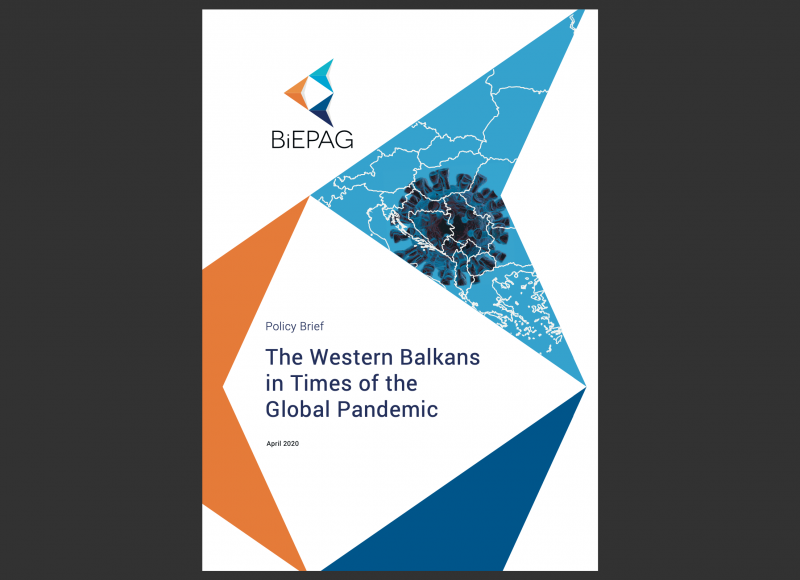
The Western Balkans in Times of the Global Pandemic
The Western Balkans in Times of the Global Pandemic
BiEPAG-Policy Brief by Florian Bieber, Tena Prelec, Marika Djolai, Donika Emini, Jovana Marović, Srdjan Majstorović, Vedran Džihić and Alida Vračić
April 2020
About BiEPAG
The Balkans in Europe Policy Advisory Group (BiEPAG) is a cooperation initiative of the European Fund for the Balkans (EFB) and Centre for the South- east European Studies of the University of Graz (CSEES) with the aim to promote the European integration of the Western Balkans and the consolidation of democratic, open countries in the region. BiEPAG is composed by prominent policy researchers from the Western Balkans and wider Europe that have established themselves for their knowledge and understanding of the Western Balkans and the processes that shape the region. Current members of the BiEPAG are: Dimitar Bechev, Florian Bieber, Srđan Cvijić, Milica Delević, Srđan Majstorović, Natasha Wunsch, Marika Djolai, Vedran Džihić, Dejan Jović, Marko Kmezić, Jovana Marović, Milan Nič, Corina Stratulat, Nikolaos Tzifakis, Alida Vračić, Shpend Emini, Zoran Nechev, Tena Prelec, Donika Emini, Jelena Vasiljević, Gjergi Vurmo and Matteo Bonomi.
Executive Summary
The global COVID-19 pandemic and the measures taken by governments around the world constitute a major rupture to the “business as usual”, and this includes the Western Balkans, too. The pandemic has been overshadowing other developments while also accelerating existing trends, and it will continue to do so.
This analysis establishes the COVID-19 pandemic as a critical juncture, a crisis that can permanently shake up institutions and societies. There are considerable dangers beyond the impact of the pandemic on human lives, ranging from an economic crisis which could turn out to be worse than the one in 2008/9, to a heightened crisis of democracy and a geopolitical shift. None of these developments are inevitable and some of the consequences of the COVID-19 pandemic for the Western Balkans can be mitigated.
By exploring nine critical fields, this analysis will highlight ways in which the pandemic and government responses pose particular challenges: 1. The Role of the State, 2. Democracy and State Capture, 3. Geopolitical Shifts, 4. New Nationalisms, 5. Social Resilience, 6. Environmental Impact, 7. Migration and Health Care, 8. Health Care and Social Security and 9. Economic Implications.
With regard to all of the critical fields, the study examines the impact and outlines possible risks and opportunities before identifying specific interventions that could prevent the worst consequences for the region.
In its emergency response, the EU needs to include all Western Balkans countries in assistance and post-emergency reconstruction plans, irrespective of the status of their accession talks. The full inclusion of the region is essential so as to prevent dire economic consequences and geopolitical drift. Support to overcome post-crisis economic and social effects should be conditioned on measures to reduce state capture.
The pandemic cannot be an excuse for an unlimited suspension of democracy and restrictions on civil liberties must be temporary, proportional and transparent. The EU needs to identify and monitor the restrictions concerning democratic institutions and civil liberties that are permissible during the state of emergency in the Western Balkans.
After the pandemic, state-society relations need to be rebuilt and the states of the region need to prioritise communication and education of the population over excessive repression. The spread of fake news is best combatted by clear and open communication, not through restrictions and censorship.
Vulnerable groups, such as the Roma, need to be given access to healthcare and be protected from discrimination. The environmental crisis in the region will not be resolved or even ameliorated and faces the risk of becoming sidelined in the interest of a quick economic recovery. The combination of reduced car traffic during the lockdown and the continued record-high lev- els of air pollution have exposed the urgency of decisive action in regulating heavy industry: many large factories keep violating environmental standards and endangering the citizens’ health.
To address the economic and social consequences, governments should support SMEs in particular, while also securing food supply for vulnerable groups. Finally, a temporary universal basic income could help citizens who have lost their livelihood.
There is both a short- and long-term need to improve the quality of hospitals in terms of equipment, adequate supplies of medication, and reducing overcrowding of acute hospital wards, along with a raise in wages for hospital staff to secure their retention. A joint approach by governments and EU member states is required to address the shortage of medical personnel due to emigration from the region, which puts an additional strain on health care.
A careful mixture of short- and long-term measures is needed to prevent the pandemic from turning into an enduring disaster for the Western Balkans. The crisis has also given greater visibility to many structural weakness- es in the region, from the weak health care systems, low trust in the state, to weak democracy and state capture, while at the same time awakening civic consciousness and serving as a backdrop for increased solidarity among citizens. Putting a spotlight on the weaknesses can help tackle them and build more resilient societies.
Downloads
